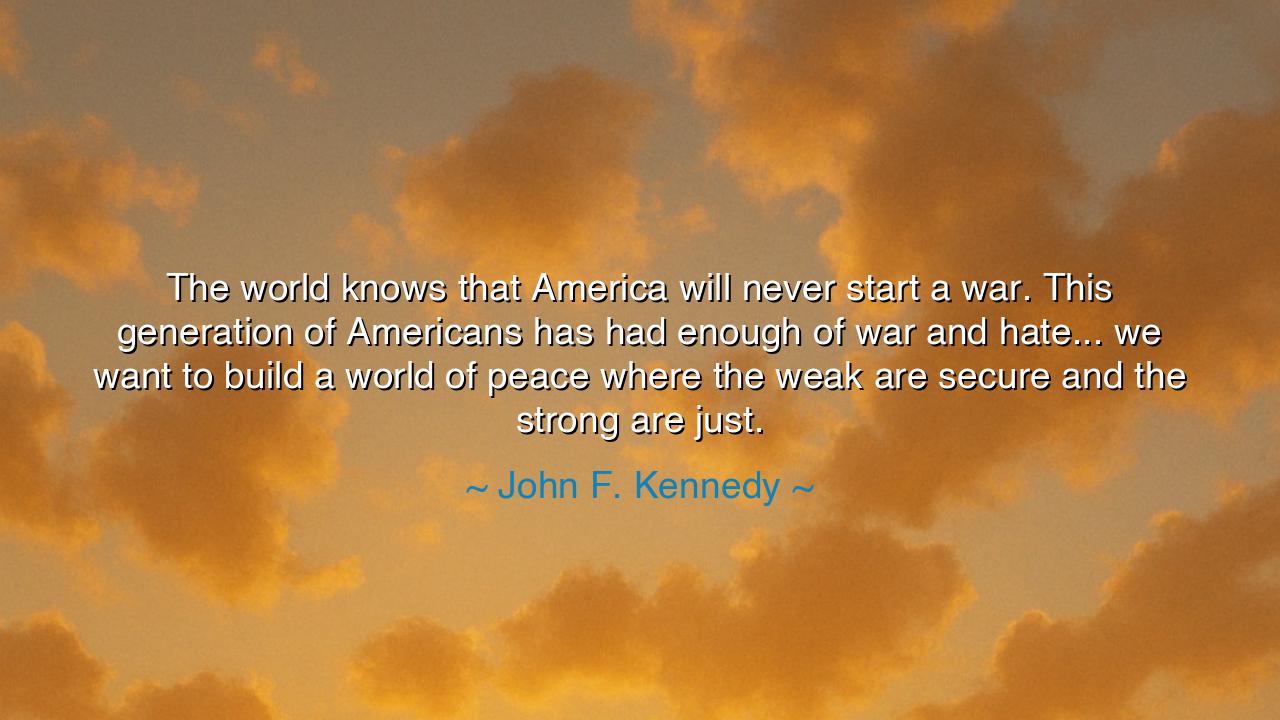
The world knows that America will never start a war. This
The world knows that America will never start a war. This generation of Americans has had enough of war and hate... we want to build a world of peace where the weak are secure and the strong are just.






Hear the noble words of John F. Kennedy, spoken with the fervor of a leader who stood between war and peace: “The world knows that America will never start a war. This generation of Americans has had enough of war and hate… we want to build a world of peace where the weak are secure and the strong are just.” These words resounded at American University in 1963, as Kennedy sought to turn the world away from the brink of nuclear annihilation. They carry not only the hope of a nation, but the ancient longing of humanity—to end the cycle of bloodshed and to establish peace, not by conquest, but by justice.
The meaning of this declaration is both clear and profound. Kennedy affirms that true greatness does not come from aggression, but from restraint. The strong, he says, must be just, exercising their power not in domination but in protection. The weak, meanwhile, must be secure, shielded from the tyranny of those who would exploit their vulnerability. This is a vision of balance: a world where might is not used to oppress, but to safeguard; a world where peace is not fragile, but rooted in justice.
The origin of the quote lies in the crucible of the Cold War. The world had only narrowly escaped destruction during the Cuban Missile Crisis of 1962, when Kennedy and Soviet leader Nikita Khrushchev brought their nations to the very edge of nuclear conflict. From that abyss, Kennedy learned deeply the futility of perpetual confrontation. Thus, in his speech at American University, he proclaimed not the triumph of arms, but the triumph of peace. He spoke to friend and foe alike, declaring that America would not seek war, but instead strive to build a more stable and humane world.
History offers shining examples that echo his vision. Consider the reign of Marcus Aurelius, the philosopher-emperor of Rome. Though he commanded legions, he wrote that the purpose of power was not to revel in blood, but to preserve the empire’s stability and protect its people. He sought, as Kennedy did, to remind the world that strength is justified only when tempered by justice, and that wars fought without necessity devour the very soul of a nation.
Yet Kennedy’s words were not naïve. He did not deny that wars might come, nor that aggression might sometimes be answered with force. But he called his people to a higher standard: to refuse the role of instigator, to be the guardian rather than the violator. His statement was both promise and warning—promise that America sought no quarrel, warning that true strength is shown not by unleashing hate, but by restraining it.
The lesson for us is timeless. In our own lives, we too hold power—perhaps not over nations, but over families, communities, and relationships. We may be strong in resources, in influence, or in voice, yet Kennedy’s wisdom calls us to use that strength not to dominate, but to uplift. Let the weak be secure in your presence, knowing you will not exploit them. Let your strength be just, so that others see in you not a tyrant, but a protector.
Therefore, let these words live in our hearts: do not be the one who begins strife. Do not let your strength be poisoned by pride. Build instead the world Kennedy envisioned: a world where power bends itself toward peace, where security is given to the vulnerable, and where justice restrains the hand of the mighty. For nations and for individuals alike, this is the only path that leads away from war and hate, and toward the eternal promise of peace.






AAdministratorAdministrator
Welcome, honored guests. Please leave a comment, we will respond soon